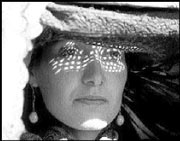KANDAHAR
written and directed by Mohsen Makhmalbaf with Nelofer Pazira, Hassan Tantﬠ and Sadou Teymouri opens Jan. 11 at Broadway Market
BENEATH THE VEIL of media, stereotype, and cultural misprision, Afghanistan would seem as distant and inscrutable now, with the Taliban bombed and defeated, as 1,000 years ago. To its western neighbor Iran, however, the fractured nation is as immediate and problematic as ever. One of the foremost figures in the Iranian New Wave, Mohsen Makhmalbaf has been there before with 1987’s The Cyclist, and now returns to the same desolate prewar terrain with the hauntingly cryptic Kandahar.
His expat protagonist, Nafas (“breath” in Farsi), has an urgent three-day deadline to re-enter the country and stop her despondent sister from committing suicide before the last solar eclipse of the 20th century. Played by Afghan-Canadian journalist Nelofer Pazira, Nafas hands out $20 bills and murmurs her thoughts (in English) into a Walkman during her clandestine mission. She’s a Western interloper in Taliban country, wearing her sky-blue burqa only as an inconvenient disguise that she impertinently flips up to interrogate anyone she encounters en route to Kandahar.
Beginning her journey, Nafas poses as the third wife of an Afghan refugee to cross the border from Iran. On the other side, the sun-dried patriarch passively praises Allah as bandits strip every possession from his terrified family. Cowardice? So it might appear to Nafas and us, but Makhmalbaf makes clear the old man’s cunning—resistance is futile; submit to the robbers and remain alive. Thus, desperate feigned piety permits survival in harsh, arid, photogenic Afghanistan. Religion is a cloak, as we’re reminded by so many prior Iranian films by Makhmalbaf, Abbas Kiarostami (Taste of Cherry), and Majid Majidi (whose Baran, dealing with Afghan refugees in Iran, opens here in February).
Later, Nafas is led by a boy, Khak (Sadou Teymouri), whom we first meet in his madrasa receiving rote instruction from an impatient mullah. Prepubescent voices rhythmically chant singsong verses from the Koran that they probably don’t understand; failing at his mindless studies, Khak is returned to poverty, then naturally latches on to Nafas as her greedy, unreliable guide to Kandahar. It’s like a package tour through a surrealist hell.
KHAK TAKES NAFAS partway to Kandahar, eventually relinquishing her to the care of a village doctor (Hassan Tantﬠa black American Muslim). His idiomatic English is a welcome shock after Nafas’ stilted narration; “no picnic” he calls the brutal, lawless countryside. The good doctor accompanies her to a Red Cross station where Russian nurses provide prosthetic legs to clamorous Afghans maimed by countless land mines that still afflict the country. (These real supplicant stubs and grim statistics can be hard to take.)
Makhmalbaf repeats Kandahar‘s central image twice with a slo-mo parachute drop of artificial legs coveted by a racing mob of men on crutches. (Female amputees are nowhere to be seen; one plaintive husband memorably compares his absent wife’s burqa and shoes to a prospective pair of wooden legs.) The effect is devastating yet oddly removed. Like Picasso’s Geurnica, Makhmalbaf aestheticizes war and suffering, turning blood into paint. Nafas and her third guide, a thief, eventually join a Kandahar-bound wedding party wearing burqas of glorious yellow, green, blue, mustard, and purple. It’s a gorgeous desert procession, replete with drums and chanting, but a tableau like the leg drop that defies narrative integration.
Kandahar isn’t entirely fictional, since Pazira’s own 1998 attempted true-life rescue mission of a childhood friend inspired Makhmalbaf’s documentary-style reportage. He’s merely using the road-movie framework to get the facts out to an appalled, incredulous world. The fall of the Taliban has overtaken his film, but that doesn’t make Afghanistan’s torment any less harrowing. Of her former homeland, Nafas is warned, “There is nothing there but famine, suffering, and massacre.”
Strangely, disconcertingly, Makhmalbaf persists in finding beauty in the same primal, eerie landscape. Women try on lipstick beneath their burqas. Conniving, illiterate Khak forces a turquoise-blue ring on Nafas because, correctly he argues, it matches her eyes. He’s right: they’re stunning—both for who’s looking through them and what they’re seeing.








